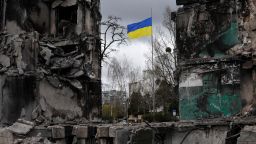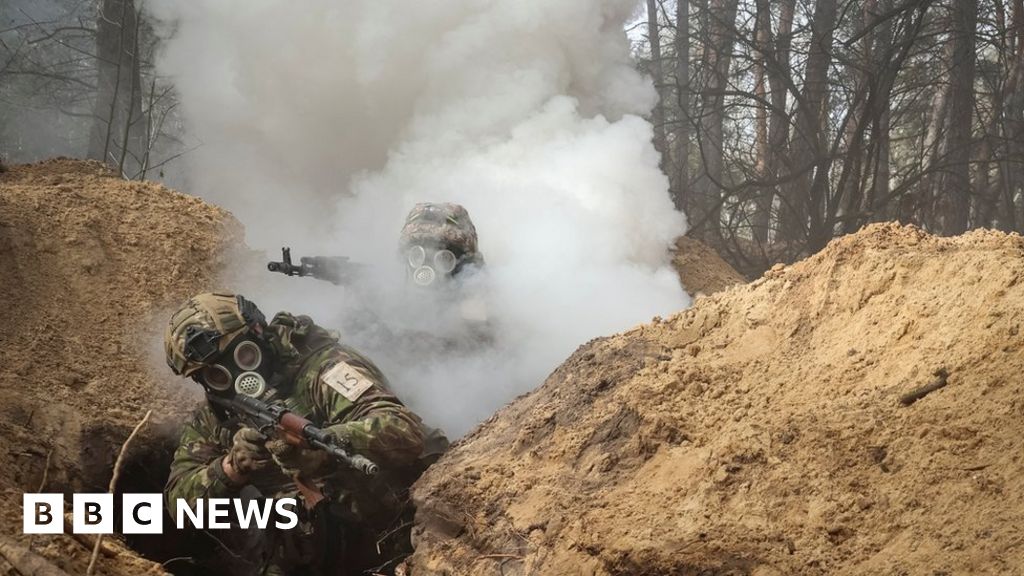Survivors say Russia is waging a war of sexual violence in occupied areas of Ukraine. Men are often the victims
By
Ivana Kottasová and Olga Voitovych, CNN
15 minute read
Updated 4:53 AM EDT, Thu May 30, 2024
Photo Illustration by CNN/Getty Images/Sergeev Pavel
Editor’s Note: This story contains graphic and disturbing descriptions of sexual violence.
KyivCNN —
Within an hour of being arrested by Russian security forces, Roman Shapovalenko was threatened with rape.
On August 25, 2022, the day after Ukraine’s Independence Day, he said three armed, masked officers from Russia’s Federal Security Service (FSB) stormed his home in the southern Ukrainian port city of
Kherson, which was
occupied by Russian forces at the time.
They turned his house inside out searching for incriminating evidence. A message in Shapovalenko’s phone that called Russian soldiers “orcs” — a derisive reference to the evil forces in J. R. R. Tolkien’s Middle-earth books and a popular Ukrainian slur for the Russian army — was enough for them. He said he was tied up, blindfolded and stuffed into an unmarked car.
For days after, Shapovalenko said he was repeatedly electrocuted in his genital area, threatened with being raped with a glass bottle, and was even made to believe he could be sterilized.
“They seemed to have a fetish for genitalia. Sometimes the door would open, and they would say: ‘We’re going to take out our batons and we’re going to rape everyone here,’” the 39-year-old farm manager told CNN.
Describing the graphic detail of his experience matter-of-factly, Shapovalenko sometimes paused to laugh nervously. He said his sense of humor is helping with what he knows will be a long recovery. The Russians, he said, hated it. “I made a little joke, and they didn’t like it. I got punched for that.”
Shapovalenko’s experience of sexual violence at the hands of Russian forces is common among Ukrainians – including civilians and soldiers – who have been detained since Russia launched its full-scale invasion of the country more than two years ago.
Human rights monitors have long reported on the
rampant use of sexual violence by Russian police and security forces against prisoners and detainees in Russia. Now it seems Russia is exporting the practice to occupied Ukraine.
A Ukrainian soldier walks through the basement of a restaurant that was allegedly used as a torture site by Russian forces during the occupation of Snihurivka in southern Ukraine.
Chris McGrath/Getty Images
Few men have spoken publicly about their ordeal, but Ukrainian prosecutors and rights groups say male victims make up a growing proportion of cases. The crimes often go unreported because of the stigma and shame associated with them. The latest United Nations Security Council annual report into conflict-related sexual violence said that 85 cases had been documented in Ukraine in 2023 – affecting 52 men, 31 women, one girl and one boy. A separate report from UN rights officials who interviewed 60 male Ukrainian prisoners of war following their release found that 39 were victims of sexual violence while in Russian detention.
CNN interviewed four male survivors, two in person and two by phone, and obtained testimonies from two more, who were held by Russian units across five Ukrainian regions that have been occupied or annexed by Moscow: Kherson, Donetsk, Zaporizhzhia, Kharkiv and Crimea. All described being subjected to forced nudity, genital electrocution – most often with wires from the Soviet-era military field telephone TA-57, known as “Tapik” – and threats of rape.
Their accounts tallied with cases documented by regional prosecutors in Kyiv, Kherson and Kharkiv and were corroborated by witnesses held in the same detention facilities in Kharkiv and Kherson.

RELATED ARTICLEThousands of Ukrainians have been sent to Russian prisons. Ukraine says they’re being held as bargaining chips
Taken together, their stories capture what prosecutors describe as Russia’s systematic and continuing use of sexual violence in occupied areas as part of its efforts to force the Ukrainian people into submission.
“We see it over and over again in different regions under occupation. They use the same method of committing sexual violence, the same method of humiliation, the same method of how they explain it to their victims,” said Anna Sosonska, a Ukrainian prosecutor and the acting chief of the conflict-related sexual violence division in Ukraine’s Office of the Prosecutor General.
Speaking to CNN from her office in Kyiv, Sosonska said that a significant number of documented crimes of sexual violence by Russian troops, including forced nudity, genital mutilation, rape and forced exposure to sexual violence against others, were being carried out against men. “Especially by using electric current on genitals – that is the top of the list,” she said.
‘They all laughed’
Roman Chernenko said he spent seven months in a “punishment cell” in a prison in the occupied city of Olenivka, in the eastern Donetsk region, after he was captured by Russian troops in Mariupol area. The 29-year-old intelligence officer with the Ukrainian military – who goes by the call sign “Omen” – described being tortured as often as three times a day, every day, for four months.
“Tapik is a military phone with two wires. One is connected to your balls, the other to your finger, and they just keep turning the current up,” he told CNN. “They just keep twisting it until the person tells them what they need.”
He said he believes officers from Russia’s GRU, the Russian Federal Penitentiary Service (FSIN) and the FSB, Russia’s main intelligence agency, all took part in the torture.
Chernenko was released as part of a prisoner exchange in January 2024 and is still recovering from the ordeal. Speaking to CNN a few weeks after his release, on the day he proposed to his girlfriend, he said it was his thoughts of her and his mother that gave him strength to survive captivity.
“They laughed when they tortured me … they told me that my mother was being f**ked by Chechens. They took me to be shot twice, they threatened me with rape,” he said.
CNN asked Russia’s Ministry of Defense, Interior Ministry, FSB, National Guard (Rosgvardia) and the military intelligence agency, known as the GRU, for comment on allegations of sexual violence at specific detention facilities, but has not received any response.
A photo taken in Bucha shows a basement believed to have been used by Russian forces to torture and kill civilians. Ukrainian police said the bodies of five men aged between 24 and 54 were found there.
Kyodo News/Getty Images
Rape and sexual violence are explicitly prohibited by the Geneva Conventions – the set of international laws that regulate the conduct of armed conflict – and can constitute a war crime. Mock execution is considered a form of torture under international law.
Under the Rome Statute of the International Criminal Court (ICC), committing rape and sexual violence in a systematic or widespread way is considered a crime against humanity.
According to Ukrainian prosecutors investigating conflict-based sexual violence and abuse, all available evidence indicates that it is a deliberate tactic, part of Russia’s modus operandi in Ukraine.
“It’s in every region that was under occupation. Everywhere that Russian troops were located, we’re seeing cases of sexual violence and gender-based violence. The bottom line is that it looks like it is Russian policy,” Sosonska said.
As of early May, Ukraine has officially recorded 293 cases of sexual violence, although Sosonska said that it is impossible to estimate the real number of crimes that are being committed, particularly in occupied territories which remain inaccessible to its investigators and prosecutors.

RELATED ARTICLEWorld must learn from Bosnian war in dealing with sexual violence in Ukraine conflict, report says
Some
37,000 Ukrainian citizens are unaccounted for, according to the Ukrainian ombudsman’s office, with thousands believed to be held in Russian detention and at risk of torture and sexual violence.
But the real scale of sexual violence committed during the war may never come to light. Only a fraction of victims tend to come forward and, according to the UN, this is especially true for men, some of whom may not initially realize that what happened to them was a sexual violence crime.
Some male victims of sexual violence may describe what happened to them instead as “torture.” The distinction, Sosonska explained, is important for any future court cases and war tribunals. Her office is also trying to educate the public about the fact that men can be victims of sexual violence – something Sosonska said may still not be fully understood.
Anna Mykytenko, who heads the Ukraine team at Global Rights Compliance (GRC), an international legal non-profit, said that Ukrainian witnesses and survivors of sexual violence have testified that Russian troops told them it was a “punishment.”
“In several villages in the south we heard witnesses and survivors say that the Russian servicemen came in, occupied the village, and then looked specifically for the wives of Ukrainian soldiers, or their mothers or sisters,” Mykytenko told CNN. GRC acts as the co-lead of the Atrocity Crimes Advisory Group, an initiative launched by the European Union, the United States and the United Kingdom to provide Ukraine with assistance in the investigation and prosecution of atrocity crimes.
Mykytenko said that while most cases of conflict-related sexual crimes that were reported and investigated earlier in the war concerned female victims, many of the cases recently recorded have been against male victims, especially against men held in captivity.
“Sexual crimes are fairly common in detention centers and it’s very common for prisoners of war or civilians to be threatened with rape or with the sexual abuse of different types, this is something that’s almost normal for the Russian and Russia-related armed forces,” she said.

mstdn.social


















